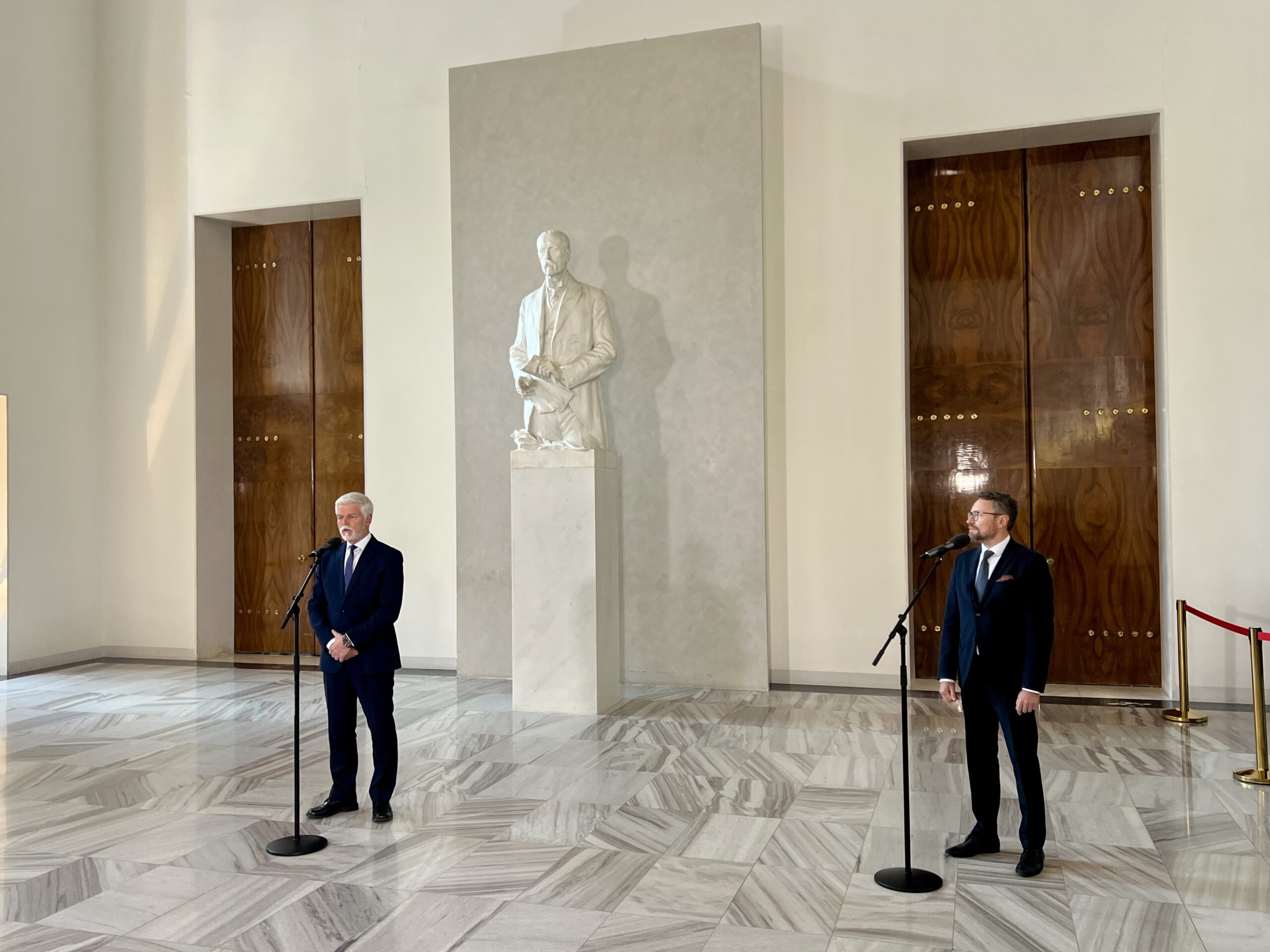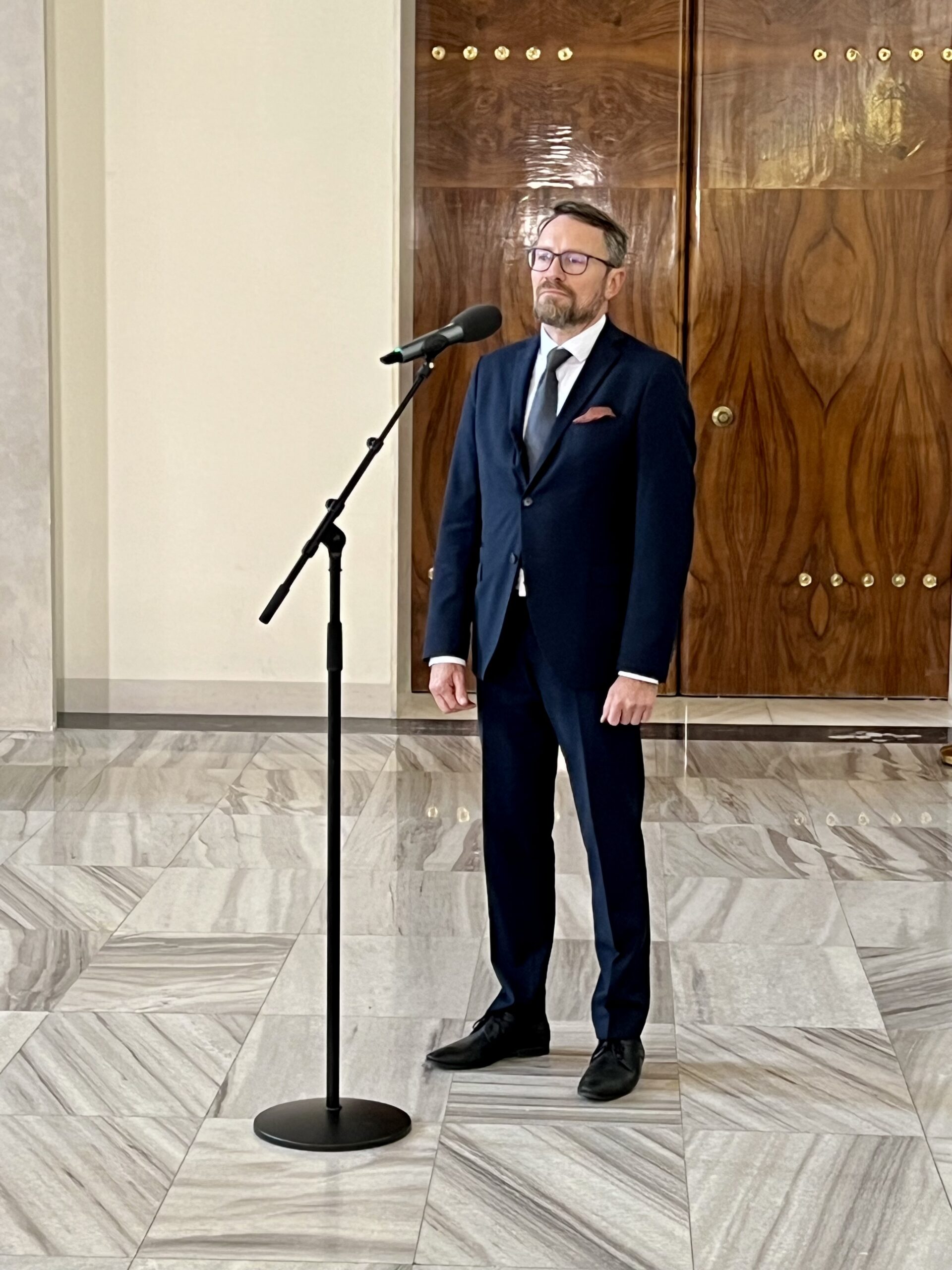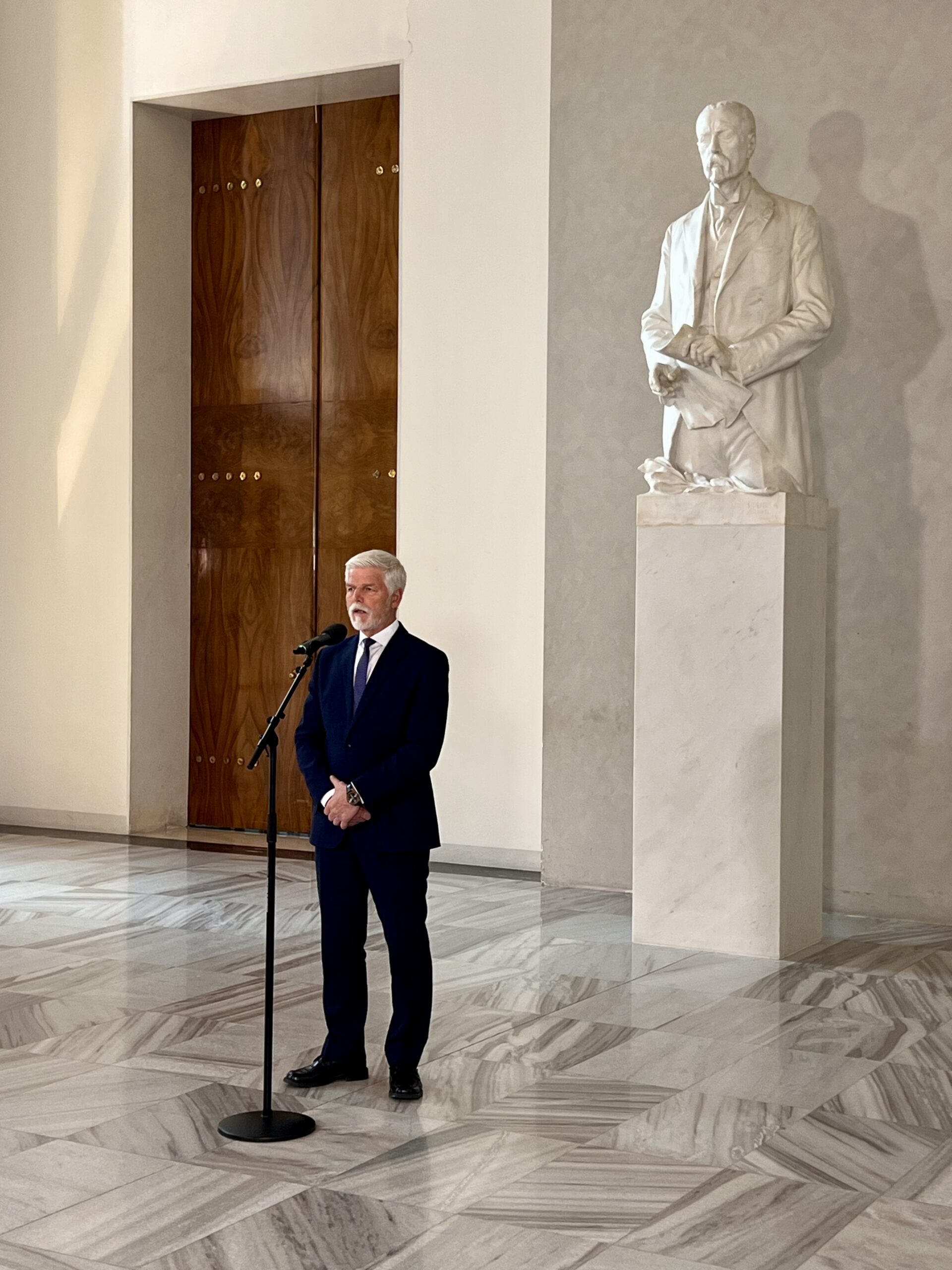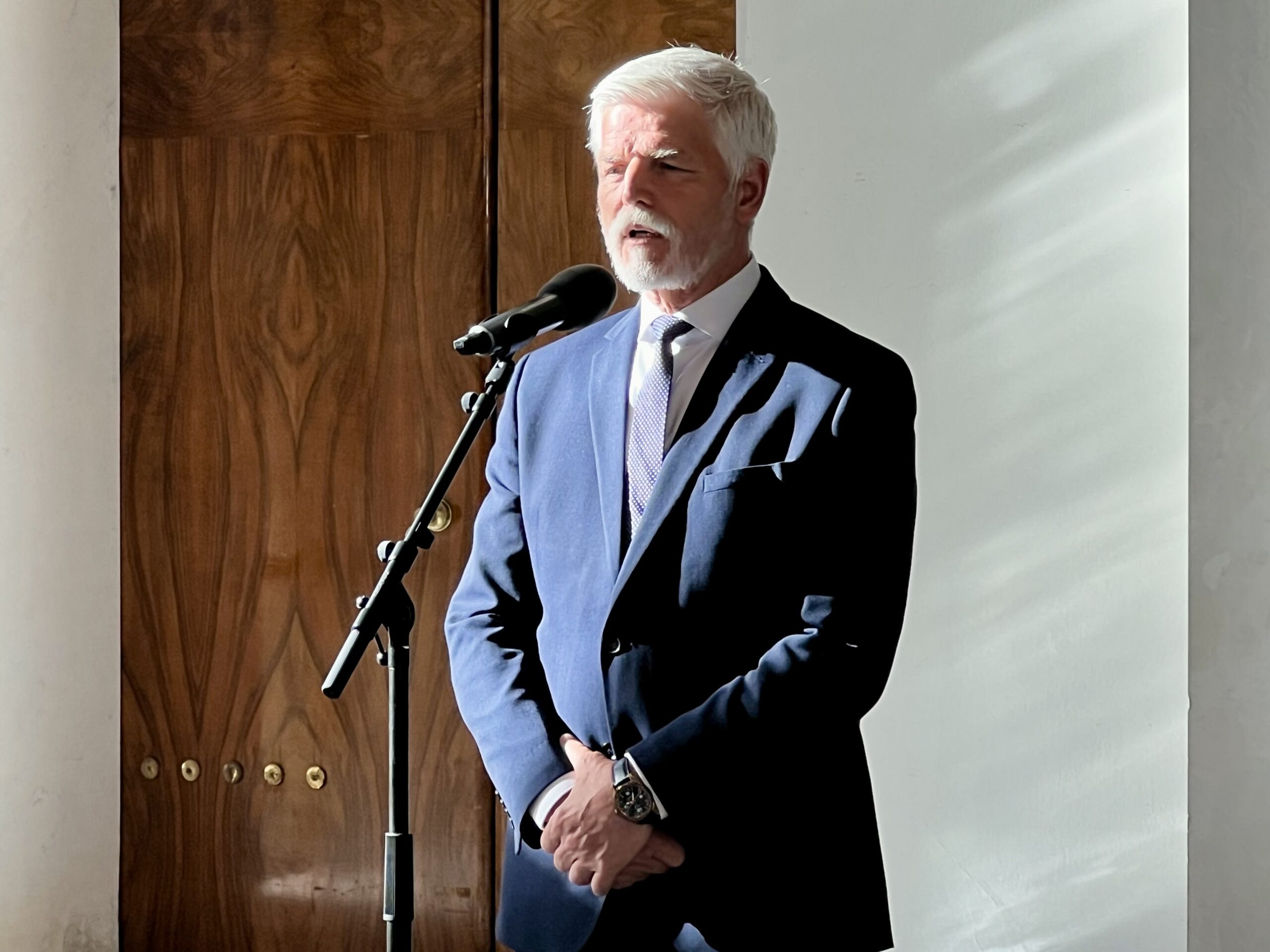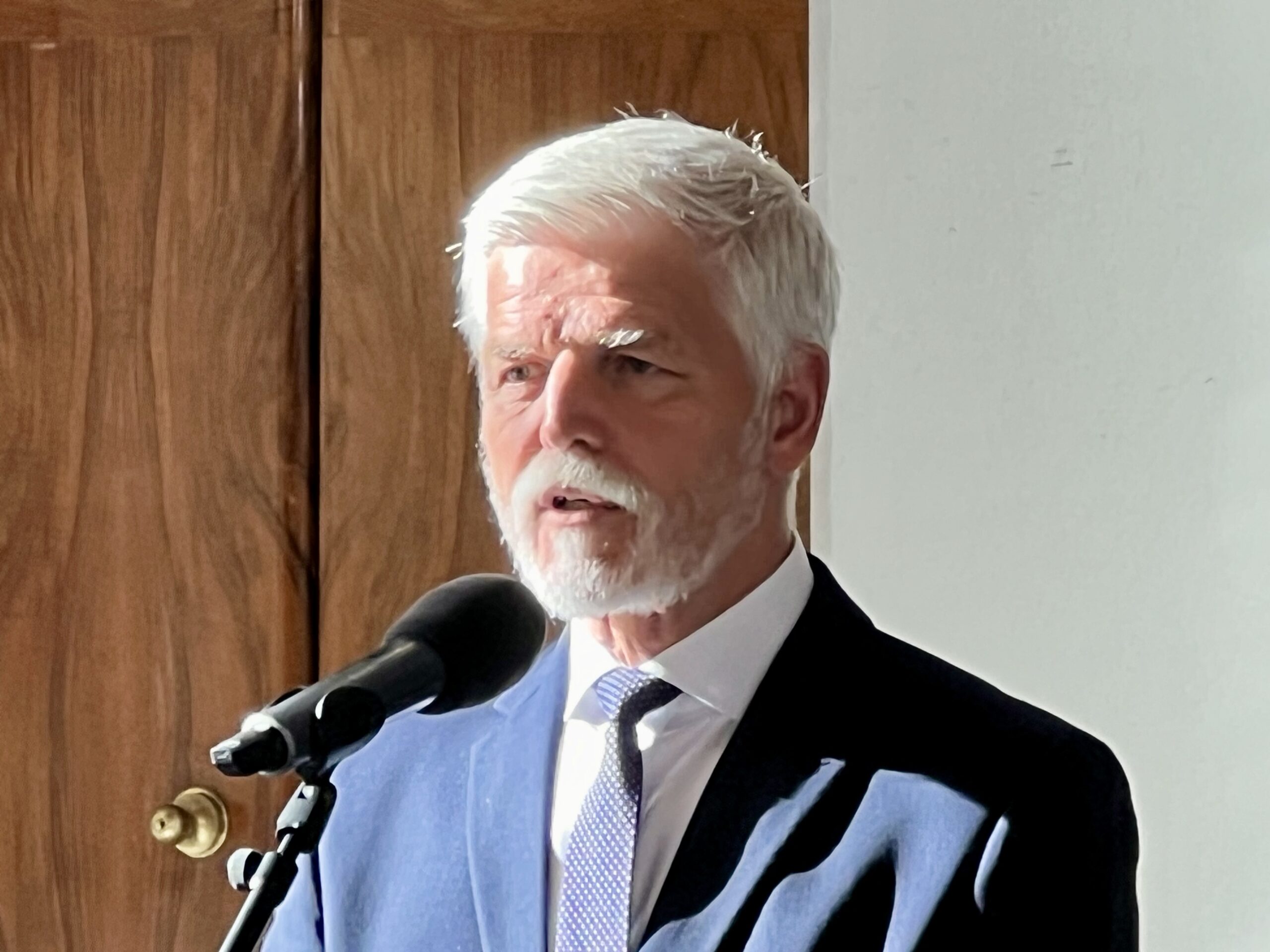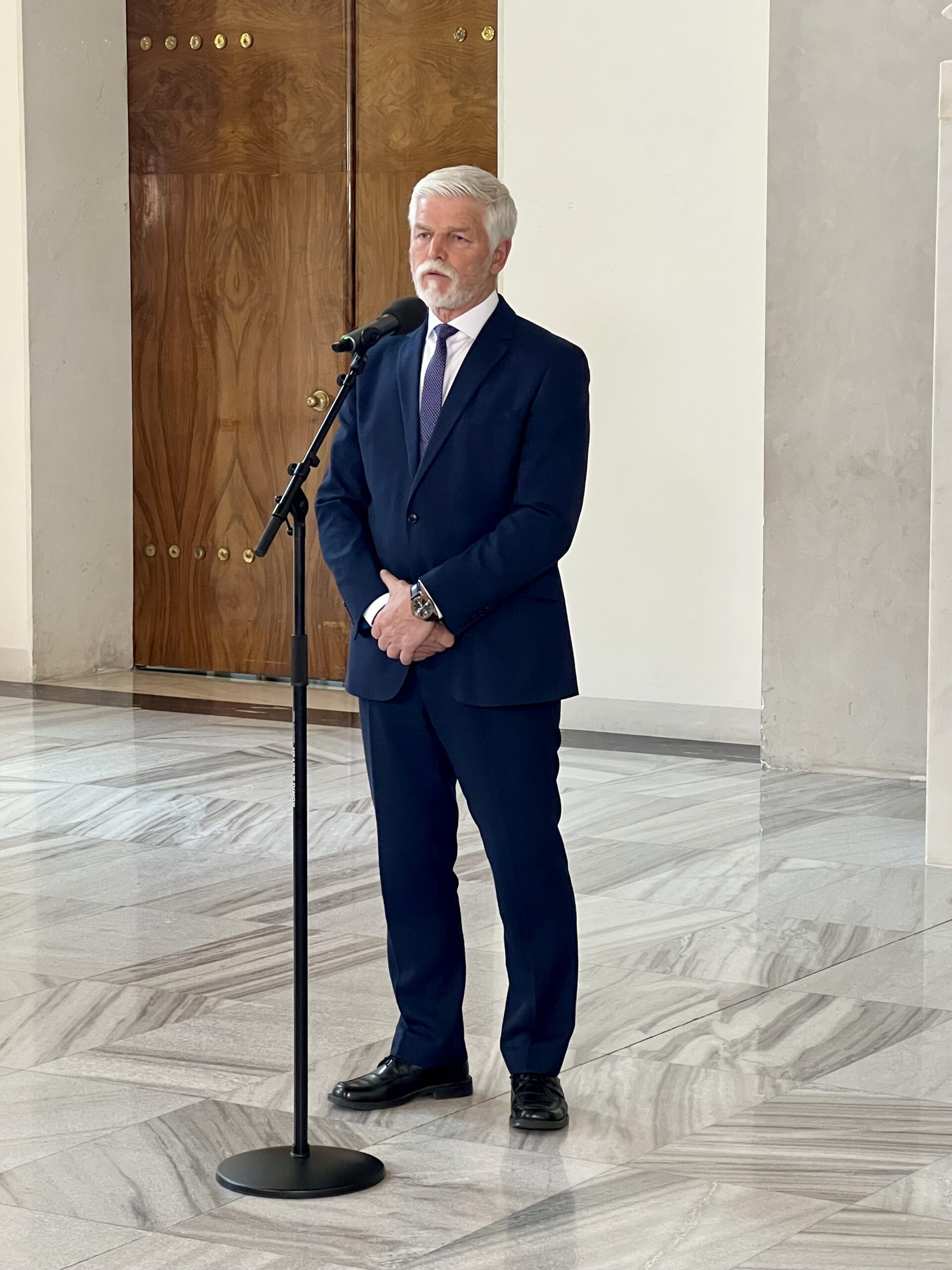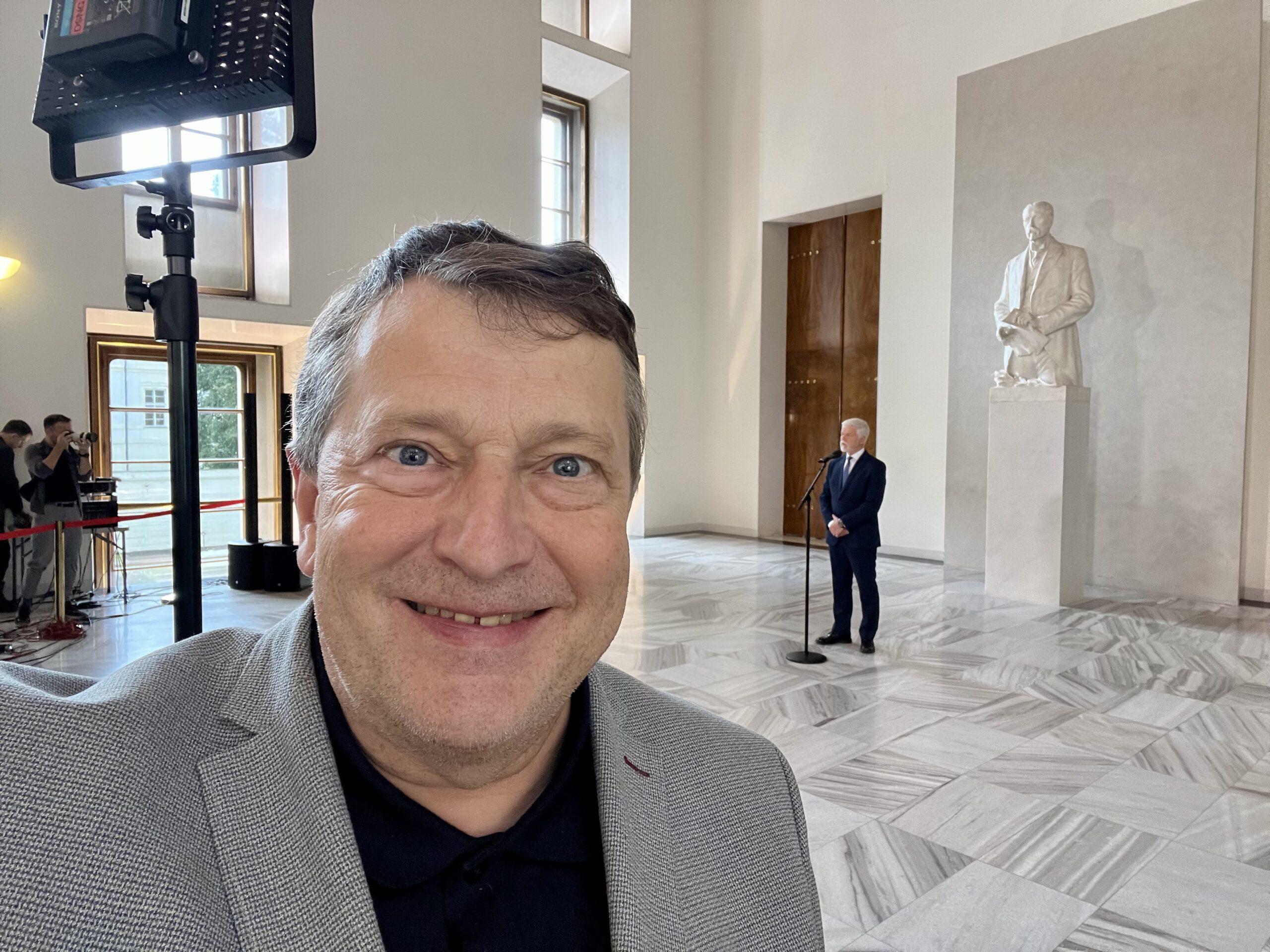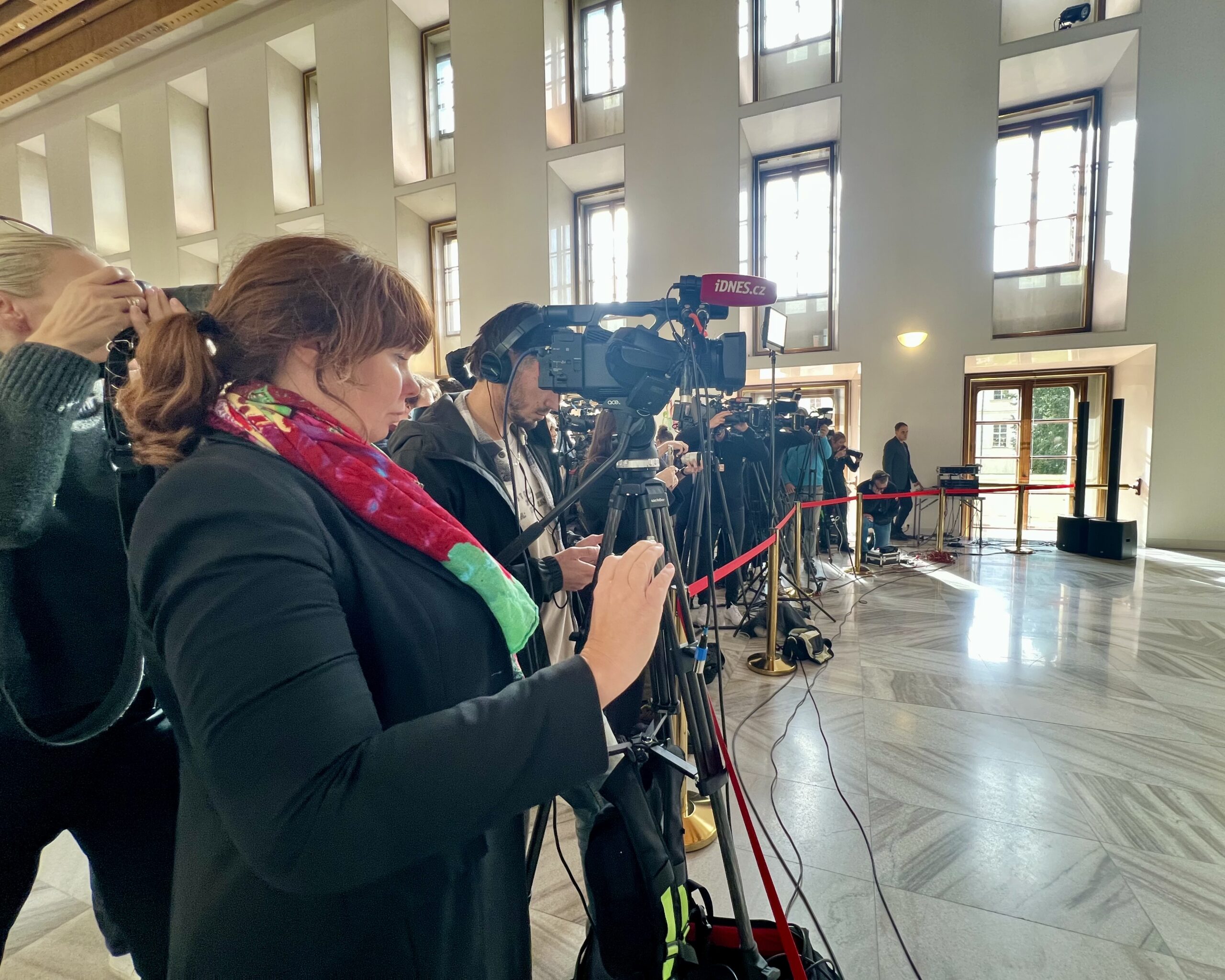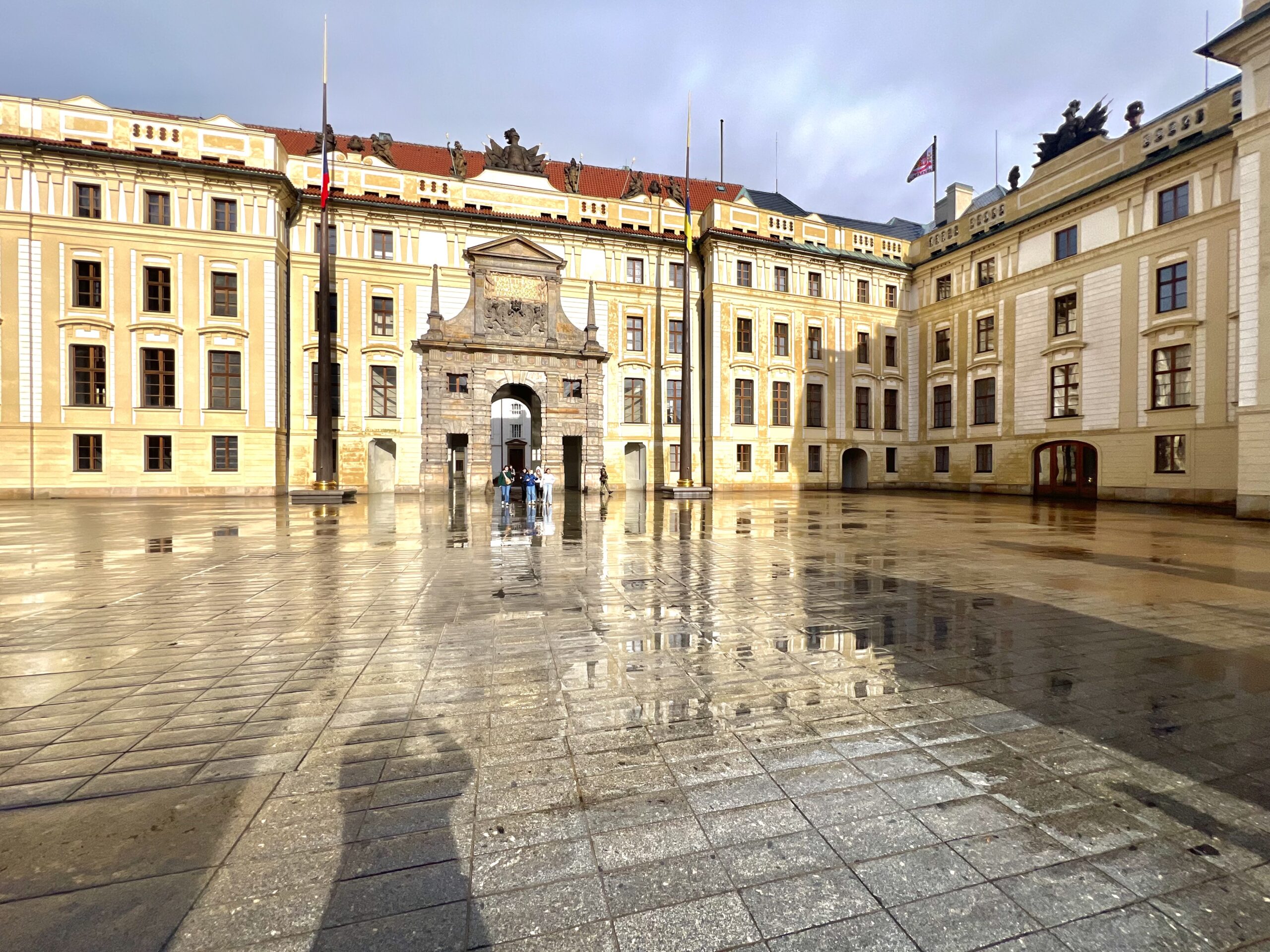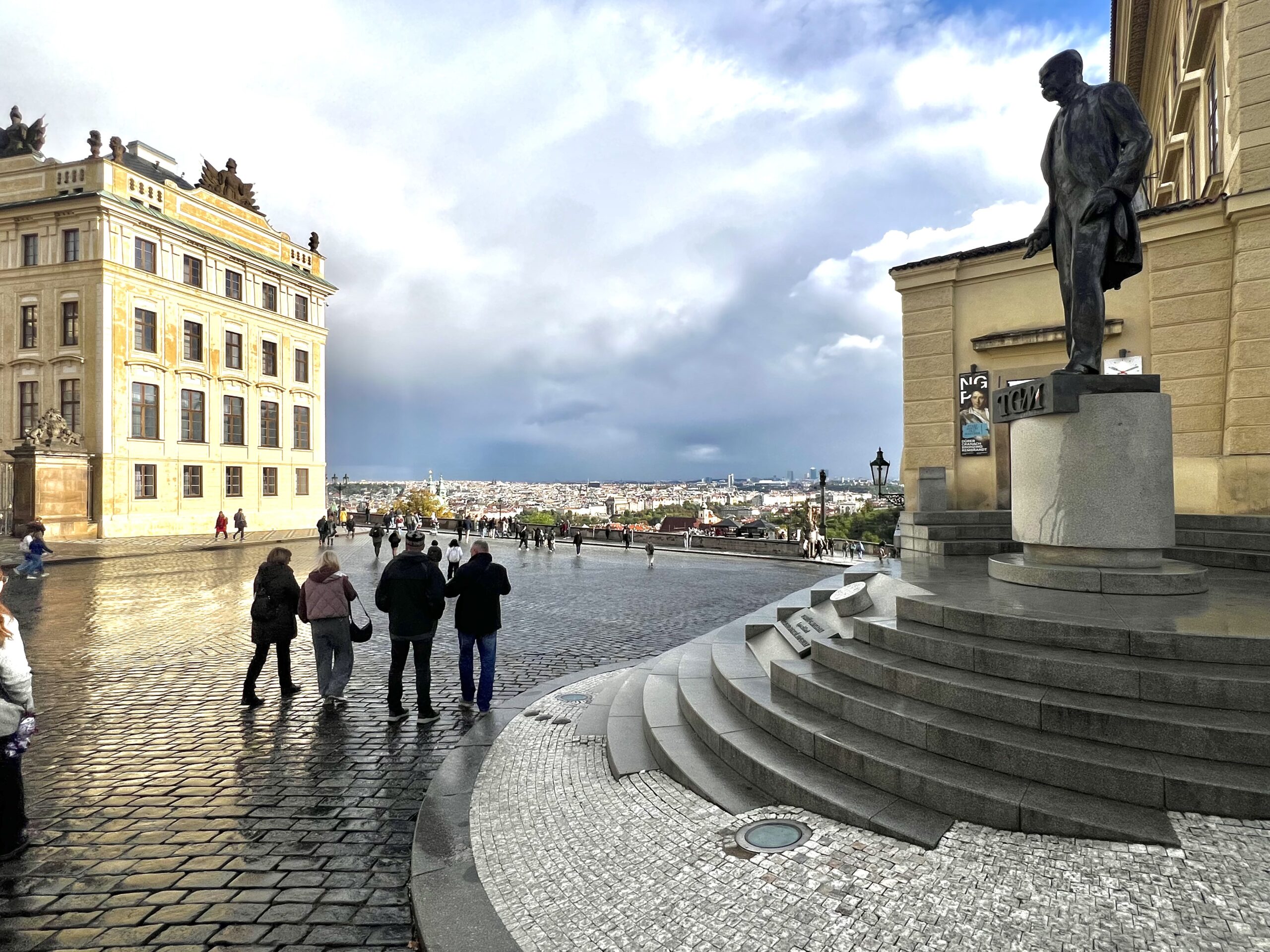- Hans Weber
- February 6, 2026
Po parlamentních volbách v České republice / After the Czech Parliamentary Elections / Nach der Parlamentswahl in Tschechien
Po parlamentních volbách v České republice: Babišovo vítězství, ale zatím bez pověření k vytvoření vlády
Po víkendových parlamentních volbách v České republice se začíná rýsovat politický boj o budoucí vládu země. Hnutí **ANO** vedené **Andrejem Babišem** dosáhlo **výrazného vítězství**, avšak **nezískalo absolutní většinu** v Poslanecké sněmovně. Bývalý premiér tak stojí před úkolem vytvořit většinovou vládu – úkolem, který přináší jak politické, tak osobní překážky.
Jednání u prezidenta: Zatím bez pověření k sestavení vlády
V neděli a pondělí vedl prezident **Petr Pavel** na zámku v Lánech první rozhovory s předsedy stran zastoupených v novém parlamentu. Vedle **Andreje Babiše (ANO)** se jednání zúčastnili **Petr Fiala (SPOLU)**, dosavadní premiér, **Vít Rakušan (STAN)**, **Markéta Pekarová Adamová (TOP 09)**, stejně jako **Stanislav Hřib** (PIRÀTY) **Filip Turek** (MOTORISTICKÈ).
Prezident oznámil, že v úterý opět vystoupí na tiskové konferenci, kde zveřejní výsledky těchto konzultací. **Formální pověření k sestavení vlády** zatím **Andrej Babiš neobdržel**. Podle politických pozorovatelů to naznačuje, že Pavel má ještě **pochybnosti**, zejména pokud jde o možné **střety zájmů** vítěze voleb.
Otázka Agrofertu: Babišova největší překážka
V centru pozornosti stojí znovu **Babišovo spojení s koncernem Agrofert**, jedním z největších průmyslových a zemědělských podniků v zemi. Již léta se diskutuje, zda Babiš jako politik nadále prostřednictvím svěřenských fondů vykonává vliv na Agrofert. Prezident Pavel zdůraznil, že otázka **transparentnosti a nezávislosti** předsedy vlády na obchodních zájmech je „klíčová pro důvěru veřejnosti“.
Z prezidentského okolí zaznívá, že se nejprve musí vyjasnit, **jak Babiš naloží se svými podíly**, zda je prodá, převede do nezávislého fondu, nebo je jinak restrukturalizuje, aby se vyloučily střety zájmů během jeho případného působení ve vládě. Právě tato nevyřešená otázka může být důvodem, proč prezident **váhá** s udělením pověření.
Koaliční možnosti a politické kalkulace
V současnosti se jako nejpravděpodobnější varianta jeví **koalice ANO a Motoristické strany (Motoristická strana)** vedené **Filipem Turkem**. Společně disponují relativní většinou, ale **nedosahují absolutní většiny**. Očekává se proto, že by tato vláda mohla být **tolerována hnutím SPD** vedeným **Tomiem Okamurou**.
Přímá účast SPD ve vládě je však **nepravděpodobná**. Okamura se obává, že by v případě vstupu do vlády musel **převzít odpovědnost**, což by omezilo jeho roli hlasitého kritika politického systému. Pozorovatelé očekávají, že raději zůstane mimo vládu a bude **vyvíjet tlak zvenčí**, aby od Babiše získal ústupky, aniž by nesl vládní odpovědnost.
Navzdory této teoretické většině zůstávají jednání **složitá**, protože Motoristická strana zastává v klíčových oblastech, například v dopravní a ekologické politice, **odlišné postoje**. Tým ANO sice naznačuje ochotu ke kompromisu, ale vyjednávání může trvat týdny.
Stínový premiér? Scénář s Havlíčkem
Uvnitř ANO se stále více hovoří o **alternativě k premiérskému postu**. Pokud prezident Pavel bude trvat na jasném oddělení politiky a byznysu, mohl by **Karel Havlíček**, dvojka hnutí ANO, **formálně převzít funkci premiéra**.
Tento model – neoficiálně označovaný jako „**varianta stínového premiéra**“ – by Babišovi umožnil **udržet politický vliv**, aniž by oficiálně zastával vládní post. Havlíček, bývalý ministr průmyslu a dopravy, je považován za loajálního spolupracovníka a pragmatického správce, který by Babišovu linii důsledně hájil.
Takové uspořádání by nebylo v české politice bezprecedentní, avšak **vyvolalo by právní i politické otázky** – zejména pokud jde o to, kdo by ve skutečnosti vykonával moc a odpovědnost.
Časový plán a další kroky
Podle prezidenta Pavla by se nový parlament měl **sejít na ustavující schůzi začátkem listopadu**. Teprve poté podá dosavadní premiér **Petr Fiala demisi**, čímž se otevře cesta pro jmenování nové vlády.
Do té doby by měly být vyřešeny klíčové otázky:
– Jaká koalice ponese budoucí vládu?
– Jakou roli bude hrát Tomio Okamura?
– A především: Jak bude vyřešen konflikt zájmů kolem Agrofertu?
Nadcházející týdny ukážou, zda se Andreji Babišovi podaří znovu usednout do Strakovy akademie – nebo zda se země připraví na **politický experiment s premiérem Havlíčkem**.
Jisté už nyní je, že českou politiku čeká **období intenzivních jednání, taktických posunů a vnitrostranických bojů**, které mohou ovlivnit mocenskou rovnováhu v zemi na dlouhá léta.
After the Czech Parliamentary Elections: Babiš Wins, but No Mandate Yet
Following the Czech parliamentary elections last weekend, the political struggle for the future government of the country has begun. The **ANO movement**, led by **Andrej Babiš**, achieved a **landslide victory** but **fell short of an absolute majority** in the Chamber of Deputies. The former prime minister now faces the challenge of forming a viable coalition — a task complicated by both political and personal obstacles.
Talks with the President: No Mandate Yet
On Sunday and Monday, President **Petr Pavel** held initial consultations at Lány Castle with the leaders of parties represented in the new parliament. Alongside **Andrej Babiš (ANO)**, participants included **Petr Fiala (SPOLU)**, the outgoing prime minister, **Vít Rakušan (STAN)**, **Markéta Pekarová Adamová (TOP 09)**, as well as **Stanislav Hřib** (PIRATES) and **Filip Turek** from the MOTORISTS PARTY.
The president announced he would hold another **press conference on Tuesday** to summarize the talks. So far, he has **not granted a formal mandate** to Babiš to form a government. Political observers interpret this hesitation as a sign that Pavel still sees **unresolved issues**, particularly concerning **conflicts of interest**.
The Agrofert Question: Babiš’s Biggest Obstacle
At the heart of the debate lies Babiš’s **connection to the Agrofert conglomerate**, one of the country’s largest industrial and agricultural groups. For years, questions have lingered over whether Babiš, despite transferring his holdings to trust funds, still exerts indirect control. President Pavel stressed that the issue of **transparency and independence** from private business is “vital to maintaining public trust.”
Sources close to the president say he wants clarity on **how Babiš will handle his holdings** — whether he intends to sell them, move them into an independent trust, or restructure them in another way to eliminate conflicts of interest. This may explain why the president has **so far withheld the mandate** to form a government.
Coalition Options and Tactical Calculations
The most likely outcome appears to be a **coalition between ANO and the Motorist Party**, led by **Filip Turek**. Together, they command a relative majority but **lack an absolute majority**. The coalition could therefore be **tolerated by the SPD**, led by **Tomio Okamura**.
However, a direct participation of SPD in government is seen as **unlikely**. Okamura fears that joining the cabinet would force him to **assume responsibility**, limiting his ability to act as a populist critic from the sidelines. Analysts believe he prefers to **pressure Babiš from outside**, extracting concessions while avoiding accountability.
Despite this potential alliance, the talks remain **complex**, as the Motorist Party diverges from ANO on several key policy areas, including transport and environmental regulation. ANO has signaled **willingness to compromise**, but negotiations could take weeks.
A Shadow Premier? The Havlíček Scenario
Within ANO, discussions are emerging about a **possible alternative candidate for prime minister**. Should President Pavel insist on a strict separation between politics and business, **Karel Havlíček**, ANO’s number two, could **formally assume the premiership**.
This so-called **“shadow premier” model** would allow Babiš to **retain political control** while avoiding formal accountability. Havlíček, a former minister of industry and transport, is considered a loyal and pragmatic operator who would faithfully implement Babiš’s policies.
Such an arrangement would not be unprecedented in Czech politics but would certainly raise **constitutional and ethical questions** — particularly concerning who truly wields power.
Timeline and Next Steps
According to President Pavel, the new parliament will convene for its **inaugural session in early November**. Only then will outgoing Prime Minister **Petr Fiala** formally resign, paving the way for the appointment of a new cabinet.
By that time, the crucial questions should be settled:
– Which coalition will support the next government?
– What role will Tomio Okamura play?
– And above all: How will the Agrofert conflict be resolved?
The coming weeks will reveal whether **Andrej Babiš returns to power** or whether the country embarks on a **political experiment with Prime Minister Havlíček**.
What is certain is that Czech politics faces a **period of intense negotiations, tactical maneuvers, and internal party struggles** that could redefine the balance of power for years to come.
Nach der Parlamentswahl in Tschechien: Babiš’ Sieg, aber noch kein Regierungsauftrag
Nach den tschechischen Parlamentswahlen am vergangenen Wochenende zeichnet sich ein politisches Ringen um die künftige Regierung des Landes ab. Die Bewegung **ANO** unter der Führung von **Andrej Babiš** ging mit einem **deutlichen Sieg** aus der Abstimmung hervor, verfehlte jedoch die absolute Mehrheit im Abgeordnetenhaus. Damit steht der ehemalige Premierminister vor der Herausforderung, eine mehrheitsfähige Regierung zu bilden – ein Unterfangen, das sowohl politische als auch persönliche Hürden mit sich bringt.
Gespräche beim Präsidenten: Noch kein Auftrag zur Regierungsbildung
Am Sonntag und Montag führte Präsident **Petr Pavel** auf Schloss Lány erste Gespräche mit den Vorsitzenden der im neuen Parlament vertretenen Parteien. Neben **Andrej Babiš (ANO)** nahmen daran **Petr Fiala (SPOLU)**, der bisherige Premierminister, **Vít Rakušan (STAN)**, **Markéta Pekarová Adamová (TOP 09)** sowie **Stanislav Hřib (PIRATEN) **und **Filip Turek** von der (AUTO PARTEI) teil.
Der Präsident kündigte an, am Dienstag erneut vor die Presse zu treten, um die Ergebnisse dieser Konsultationen bekanntzugeben. Einen **formellen Regierungsauftrag** an Andrej Babiš hat er bislang **nicht erteilt**. Beobachter deuten dies als Zeichen dafür, dass Pavel noch **Klärungsbedarf in mehreren Punkten** sieht – insbesondere im Hinblick auf mögliche **Interessenkonflikte** des Wahlsiegers.
Die Frage Agrofert: Babiš’ größtes Hindernis
Im Mittelpunkt steht dabei einmal mehr die **Verbindung zwischen Babiš und dem Konzern Agrofert**, einem der größten Industrie- und Agrarunternehmen des Landes. Seit Jahren wird darüber diskutiert, ob Babiš als Politiker über seine Treuhandfonds weiterhin Kontrolle oder Einfluss auf Agrofert ausübt. Präsident Pavel betonte, dass die Frage der **Transparenz und Unabhängigkeit** des Regierungschefs von wirtschaftlichen Interessen „von zentraler Bedeutung für das Vertrauen der Öffentlichkeit“ sei.
Aus dem Umfeld des Präsidenten heißt es, man wolle zunächst Klarheit darüber gewinnen, **wie Babiš seine Beteiligungen künftig handhaben** wird – ob er sie verkauft, in einen unabhängigen Fonds überträgt oder in anderer Weise strukturiert, um Interessenkonflikte während einer neuen Amtszeit auszuschließen. Diese offene Frage könnte der Grund sein, warum der Präsident bislang **zögert**, den Auftrag zur Regierungsbildung zu erteilen.
Koalitionsoptionen und taktisches Kalkül
Derzeit gilt eine **Koalition zwischen ANO und der Motoristischen Partei (Motoristická strana)** unter **Filip Turek** als die wahrscheinlichste Option. Gemeinsam verfügen sie über eine relative Mehrheit, erreichen jedoch **keine absolute Mehrheit**. Daher wird erwartet, dass das Bündnis **von der SPD unter Tomio Okamura toleriert** werden könnte.
Eine direkte Regierungsbeteiligung der SPD ist indes **wenig wahrscheinlich**. Tomio Okamura fürchtet, in einer Regierungskoalition selbst **Verantwortung übernehmen** zu müssen – was ihn in seiner Rolle als lautstarker Kritiker des politischen Establishments einschränken würde. Beobachter gehen davon aus, dass er lieber **Zugeständnisse von Babiš erpresst**, ohne sich selbst in die Regierungsverantwortung zu begeben.
Trotz dieser rechnerisch möglichen Mehrheit sind die Verhandlungen **kompliziert**, da die Motoristische Partei in mehreren Kernfragen – etwa bei Umwelt- und Verkehrspolitik – **abweichende Positionen** vertritt. Babiš’ Team signalisiert zwar Kompromissbereitschaft, doch die Koalitionsgespräche dürften sich hinziehen.
Ein Schattenpremier? Das Szenario Havlíček
Innerhalb der ANO wird zunehmend offen über eine **Alternative zum Premierposten** diskutiert. Sollte Präsident Pavel auf einer klaren Trennung zwischen Politik und Wirtschaft bestehen, könnte **Karel Havlíček**, die Nummer 2 der Bewegung, **offiziell das Amt des Premierministers übernehmen**.
Dieses Modell – inoffiziell bereits als „**Schattenpremier-Variante**“ bezeichnet – würde es Babiš ermöglichen, **politische Kontrolle** und strategischen Einfluss zu behalten, ohne formal Regierungschef zu sein. Havlíček, früher Minister für Industrie und Verkehr, gilt als loyaler Vertrauter und pragmatischer Verwalter, der die Interessen von Babiš zuverlässig umsetzt.
Ein solches Arrangement wäre in der tschechischen Politik nicht beispiellos, würde aber **Verfassungsrechtler und Öffentlichkeit gleichermaßen herausfordern**. Die Frage, wer die tatsächliche Macht ausübt, könnte zu politischen Spannungen führen – insbesondere im Verhältnis zum Präsidenten.
Zeitplan und nächste Schritte
Laut der Ankündigung des Präsidenten soll das neu gewählte Parlament **Anfang November** zu seiner **konstituierenden Sitzung** zusammentreten. Erst danach wird der bisherige Premier **Petr Fiala offiziell zurücktreten**, was den Weg für die Ernennung eines neuen Regierungschefs freimacht.
Bis dahin dürften die entscheidenden Fragen geklärt sein:
– Welche Koalition trägt Babiš’ künftige Regierung?
– Welche Rolle spielt Tomio Okamura dabei tatsächlich?
– Und vor allem: Wie wird der Konflikt um Agrofert beigelegt?
Die kommenden Wochen werden zeigen, ob Andrej Babiš erneut in die Staatskanzlei auf dem Hradschin einzieht – oder ob sich das Land auf ein **politisches Experiment mit einem Premier Havlíček** einstellen muss.
Eines ist bereits jetzt klar: Die tschechische Politik steht vor einer **Phase intensiver Verhandlungen, innerparteilicher Machtspiele und taktischer Verschiebungen**, die das politische Gleichgewicht in Prag für Jahre prägen könnten.
Recent posts
See AllPrague Forum Membership
Join us
Be part of building bridges and channels to engage all the international key voices and decision makers living in the Czech Republic.
Become a member